六年级上册英语句子.doc
- 格式:doc
- 大小:47.50 KB
- 文档页数:13
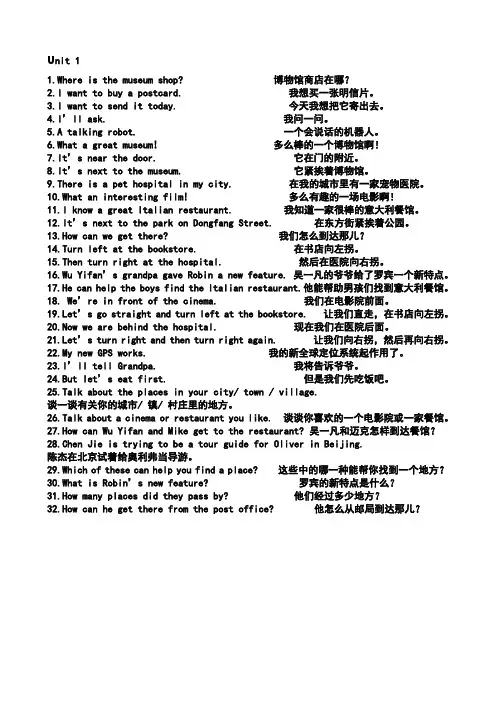
U nit 11.Where is the museum shop? 博物馆商店在哪?2.I want to buy a postcard. 我想买一张明信片。
3.I want to send it today. 今天我想把它寄出去。
4.I’ll ask. 我问一问。
5.A talking robot. 一个会说话的机器人。
6.What a great museum! 多么棒的一个博物馆啊!7.It’s near the door. 它在门的附近。
8.It’s next to the museum. 它紧挨着博物馆。
9.There is a pet hospital in my city. 在我的城市里有一家宠物医院。
10.What an interesting film! 多么有趣的一场电影啊!11.I know a great Italian restaurant. 我知道一家很棒的意大利餐馆。
12.It’s next to the park on Dongfang Street. 在东方街紧挨着公园。
13.How can we get there? 我们怎么到达那儿?14.Turn left at the bookstore. 在书店向左拐。
15.Then turn right at the hospital. 然后在医院向右拐。
16.Wu Yifan’s grandpa gave Robin a new feature. 吴一凡的爷爷给了罗宾一个新特点。
17.He can help the boys find the Italian restaurant.他能帮助男孩们找到意大利餐馆。
18. We’re in front of the cinema. 我们在电影院前面。
19.Let’s go straight and turn left at the bookstore. 让我们直走,在书店向左拐。
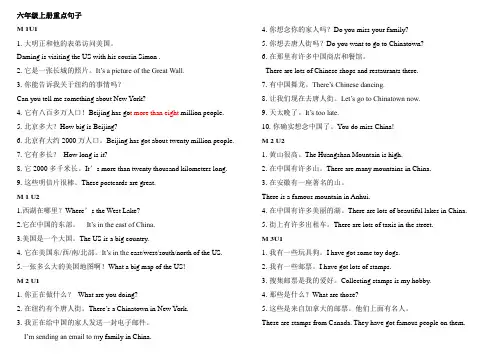
六年级上册重点句子M 1U11.大明正和他的表弟访问美国。
Daming is visiting the US with his cousin Simon .2.它是一张长城的照片。
It’s a picture of the Great Wall.3.你能告诉我关于纽约的事情吗?Can you tell me something about New York?4.它有八百多万人口!Beijing has go t more than eight million people.5.北京多大?How big is Beijing?6.北京有大约2000万人口。
Beijing has got about twenty million people.7.它有多长?How long is it?8.它2000多千米长。
It’s more than twenty thousand kilometers long.9.这些明信片很棒。
These postcards are great.M 1 U21.西湖在哪里?Where’s the West Lake?2.它在中国的东部。
It’s in the east of China.3.美国是一个大国。
The US is a big country.4.它在美国东/西/南/北部。
It’s in the east/west/south/north of the US.5.一张多么大的美国地图啊!What a big map of the US!M 2 U11.你正在做什么?What are you doing?2.在纽约有个唐人街。
There’s a Chinatown in New York.3.我正在给中国的家人发送一封电子邮件。
I’m sending an email to m y family in China. 4.你想念你的家人吗?Do you miss your family?5.你想去唐人街吗?Do you want to go to Chinatown?6.在那里有许多中国商店和餐馆。
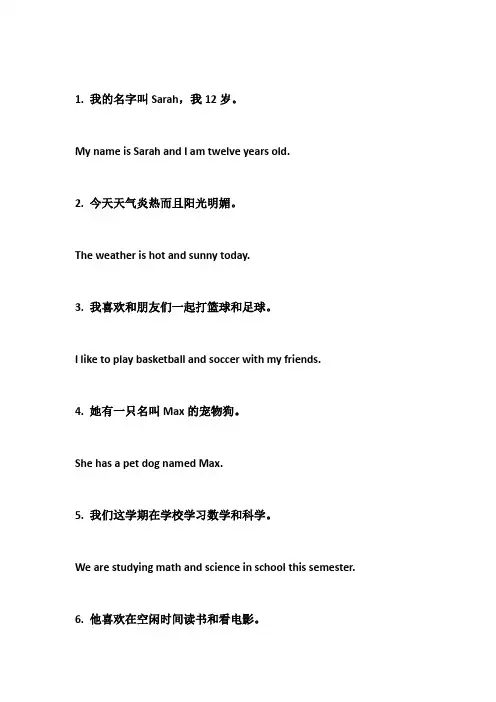
1. 我的名字叫Sarah,我12岁。
My name is Sarah and I am twelve years old.2. 今天天气炎热而且阳光明媚。
The weather is hot and sunny today.3. 我喜欢和朋友们一起打篮球和足球。
I like to play basketball and soccer with my friends.4. 她有一只名叫Max的宠物狗。
She has a pet dog named Max.5. 我们这学期在学校学习数学和科学。
We are studying math and science in school this semester.6. 他喜欢在空闲时间读书和看电影。
He enjoys reading books and watching movies in his free time.7. 他们上个周末去了海滩,玩得很开心。
They went to the beach last weekend and had a great time. 8. 我最喜欢的颜色是蓝色,最喜欢的食物是披萨。
My favorite color is blue and my favorite food is pizza.9. 演唱会上的音乐非常响亮且令人兴奋。
The music at the concert was very loud and exciting.10. 她总是帮父母做家务。
She always helps her parents with household chores.11. 我们在学校学习英语、历史和地理。
We study English, history and geography at school.12. 爷爷喜欢养花,他的花园里有很多漂亮的花。
Grandpa likes gardening and his garden has many beautiful flowers. 13. 我们的学校有一个大图书馆,里面有很多好书。
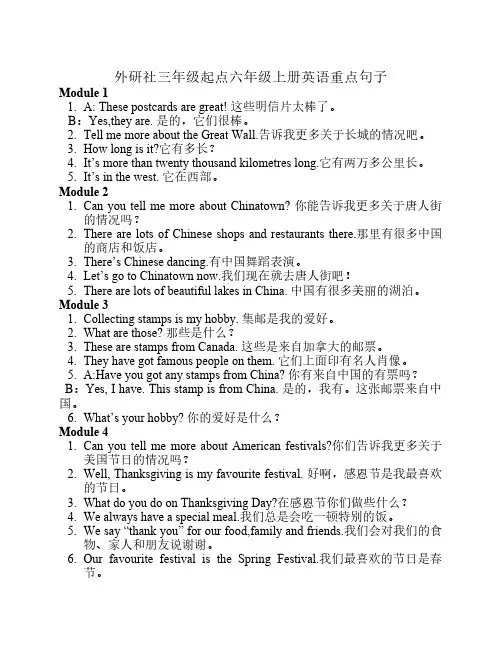
外研社三年级起点六年级上册英语重点句子Module 11. A: These postcards are great! 这些明信片太棒了。
B:Yes,they are. 是的,它们很棒。
2. Tell me more about the Great Wall.告诉我更多关于长城的情况吧。
3. How long is it?它有多长?4. It’s more than twenty thousand kilometres long.它有两万多公里长。
5. It’s in the west. 它在西部。
Module 21. Can you tell me more about Chinatown? 你能告诉我更多关于唐人街的情况吗?2. There are lots of Chinese shops and restaurants there.那里有很多中国的商店和饭店。
3. There’s Chinese dancing.有中国舞蹈表演。
4. Let’s go to Chinatown now.我们现在就去唐人街吧!5. There are lots of beautiful lakes in China. 中国有很多美丽的湖泊。
Module 31. Collecting stamps is my hobby. 集邮是我的爱好。
2. What are those? 那些是什么?3. These are stamps from Canada. 这些是来自加拿大的邮票。
4. They have got famous people on them. 它们上面印有名人肖像。
5. A:Have you got any stamps from China? 你有来自中国的有票吗?B:Yes, I have. This stamp is from China. 是的,我有。
这张邮票来自中国。
6. What’s your hobby? 你的爱好是什么?Module 41. Can you tell me more about American festivals?你们告诉我更多关于美国节日的情况吗?2. Well, Thanksgiving is my favourite festival. 好啊,感恩节是我最喜欢的节日。
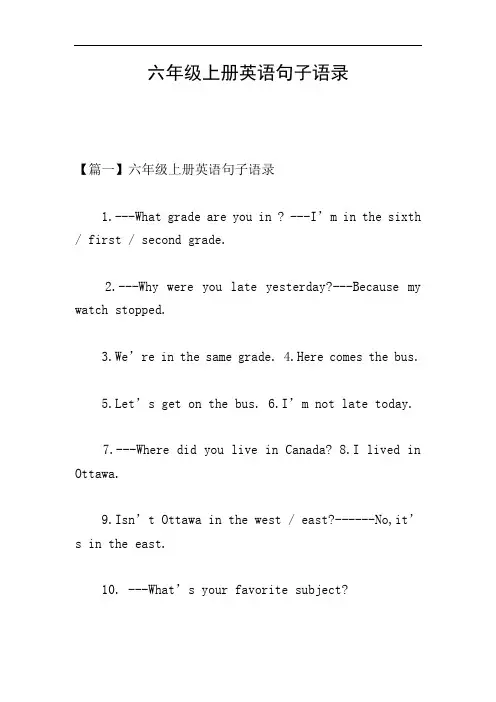
六年级上册英语句子语录【篇一】六年级上册英语句子语录1.---What grade are you in ? ---I’m in the sixth / first / second grade.2.---Why were you late yesterday?---Because my watch stopped.3.We’re in the same grade.4.Here comes the bus.5.Let’s get on the bus.6.I’m not late today.7.---Where did you live in Canada? 8.I lived in Ottawa.9.Isn’t Ottawa in the west / east?------No,it’s in the east.10. ---What’s your favorite subject?11.I’m not good at calculating.12.Which do you like better, the purple one or the gray one?13.I like the gray one better.7.This shirt is too small for me.14.---Do you have a bigger one?---Sure! This is the biggest one.15.That shirt looks good on you.16.Let’s go into the shop.16. Can I try this shirt on ? -----Of course.17.---Go down this street and turn right / left. It’ll be on your left / right.18.You should be more careful.19.We can cross the street.10.---How tall are you?---I’m 150cm tall.11.I’m taller than you are. 12.I’m the tallest.11.I want to ride the roller coaster.---I’m tall enough.12. ---Shall we go to the safari park? ---Yes, I’m interested in jungle life13.I want to take pictures of them. 14.Can I borrow your camera?15.---I can’t find my brother.---We’ve got to call the police.16.Please take all your coins out. 17.I’m afraid of tigers.18.Qiaoqiao is missing. 19.Let’s ask her for help.19.---What does he / your son look like? --- He has small brown eyes.20.What’s he wearing? -----He’s wearing a green shirt and glasses.22.---Is he / Qiaoqiao as tall as you?---No, he’s shorter than I am.23.A boy is coming out of the restroom. 24.Oh,that’s my son!25.When did you lose your son? 26.About half an hour ago.【篇二】六年级上册英语句子语录特殊疑问句What…….1.A: What’s your name? 你叫什么名字?B: My name’s Chen Jie. 我叫陈洁。
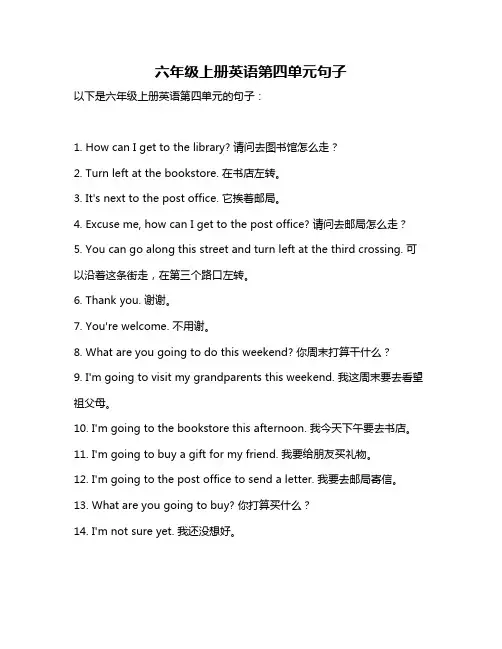
六年级上册英语第四单元句子
以下是六年级上册英语第四单元的句子:
1. How can I get to the library? 请问去图书馆怎么走?
2. Turn left at the bookstore. 在书店左转。
3. It's next to the post office. 它挨着邮局。
4. Excuse me, how can I get to the post office? 请问去邮局怎么走?
5. You can go along this street and turn left at the third crossing. 可以沿着这条街走,在第三个路口左转。
6. Thank you. 谢谢。
7. You're welcome. 不用谢。
8. What are you going to do this weekend? 你周末打算干什么?
9. I'm going to visit my grandparents this weekend. 我这周末要去看望祖父母。
10. I'm going to the bookstore this afternoon. 我今天下午要去书店。
11. I'm going to buy a gift for my friend. 我要给朋友买礼物。
12. I'm going to the post office to send a letter. 我要去邮局寄信。
13. What are you going to buy? 你打算买什么?
14. I'm not sure yet. 我还没想好。
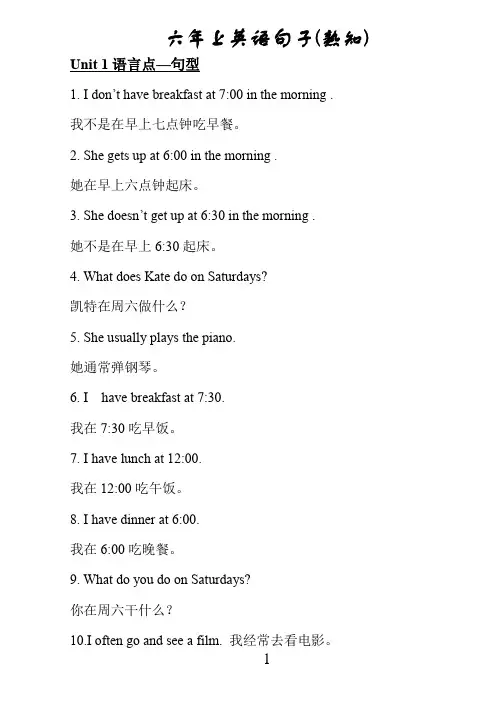
六年上英语句子(熟知) Unit 1语言点—句型1. I don’t have breakfast at 7:00 in the morning .我不是在早上七点钟吃早餐。
2. She gets up at 6:00 in the morning .她在早上六点钟起床。
3. She doesn’t get up at 6:30 in the morning .她不是在早上6:30起床。
4. What does Kate do on Saturdays?凯特在周六做什么?5. She usually plays the piano.她通常弹钢琴。
6. I have breakfast at 7:30.我在7:30吃早饭。
7. I have lunch at 12:00.我在12:00吃午饭。
8. I have dinner at 6:00.我在6:00吃晚餐。
9. What do you do on Saturdays?你在周六干什么?10.I often go and see a film. 我经常去看电影。
Unit 2语言点—句型1.What’s your grandpa’s hobby?你爷爷的爱好是什么?2.His hobby is fishing .他的爱好是钓鱼。
3.What are you interested in?你对什么感兴趣?4.I’m interested in taking photos.我对拍照感兴趣。
5.What’s your hobby?你的爱好是什么?6. My hobby is collecting maps.我的爱好是收集地图。
6.What’s your dad’s hobby?你爸爸的爱好是什么?7.His hobby is planting flowers .他的爱好是种花。
1.What kind of cake would you like? 你想要什么种类的蛋糕?2.I’d like a heart-shaped cake. 我想要一个心形的蛋糕。
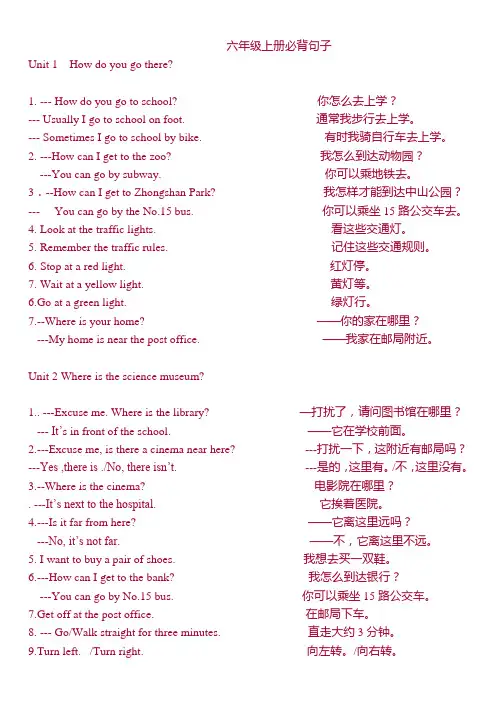
六年级上册必背句子Unit 1 How do you go there?1. --- How do you go to school? 你怎么去上学?--- Usually I go to school on foot. 通常我步行去上学。
--- Sometimes I go to school by bike. 有时我骑自行车去上学。
2. ---How can I get to the zoo? 我怎么到达动物园?---You can go by subway. 你可以乘地铁去。
3.--How can I get to Zhongshan Park? 我怎样才能到达中山公园?--- You can go by the No.15 bus. 你可以乘坐15路公交车去。
4. Look at the traffic lights. 看这些交通灯。
5. Remember the traffic rules. 记住这些交通规则。
6. Stop at a red light. 红灯停。
7. Wait at a yellow light. 黄灯等。
6.Go at a green light. 绿灯行。
7.--Where is your home? ——你的家在哪里?---My home is near the post office. ——我家在邮局附近。
Unit 2 Where is the science museum?1.. ---Excuse me. Where is the library? —打扰了,请问图书馆在哪里?--- It’s in front of the school. ——它在学校前面。
2.---Excuse me, is there a cinema near here? ---打扰一下,这附近有邮局吗?---Yes ,there is ./No, there isn’t.---是的,这里有。
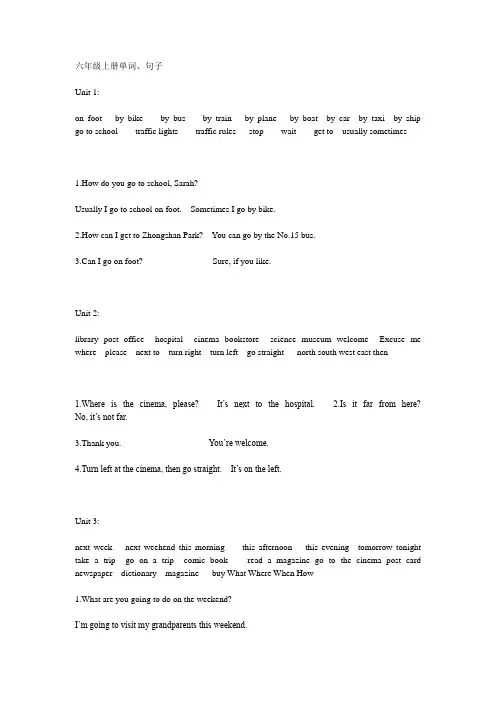
六年级上册单词、句子Unit 1:on foot by bike by bus by train by plane by boat by car by taxi by ship go to school traffic lights traffic rules stop wait get to usually sometimes1.How do you go to school, Sarah?Usually I go to school on foot. Sometimes I go by bike.2.How can I get to Zhongshan Park? You can go by the No.15 bus.3.Can I go on foot? Sure, if you like.Unit 2:library post office hospital cinema bookstore science museum welcome Excuse me where please next to turn right turn left go straight north south west east then1.Where is the cinema, please? It’s next to the hospital.2.Is it far from here? No, it’s not far.3.Thank you. You’re welcome.4.Turn left at the cinema, then go straight. It’s on the left.Unit 3:next week next weehend this morning this afternoon this evening tomorrow tonight take a trip go on a trip comic book read a magazine go to the cinema post card newspaper dictionary magazine buy What Where When How1.What are you going to do on the weekend?I’m going to visit my grandparents this weekend.2.Where are you going this afternoon?I’m going to the bookstore.3.What are you going to buy?I am going to buy a comic book.4.When are you going to the bookstore?I’m going to the bookstore at 3 o’clock.5.How are you going to the bookstore?I’m going to the bookstore by bus.Unit 4:pen pal hobby riding a bike diving playing the violinmaking kites collecting stamps live teaches English watches goes to work does doesn’t=does not reads newspapers1.What’s your hobby? I like collecting stamps.2.What’s his hobby? He likes collecting stamps.3. What’s her hobby? She likes collecting stamps.4.Does she teach English? No, she doesn’t.5.Does she teach you math? Yes, she does.Unit 5:singer writer actor actress artist cleanerTV reporter engineer accountant policeman teacher salesperson driver worker doctor nurse sell design work factory company1.What does your mother do? She is a TV reporter.2.Where does she work? She works in a school.3.How does she go to work? She goes to work by bus.4.What are you going to be? I’m going to be an engineer.5. Who is she? She’s my aunt.Unit 6:rain cloud sun stream vapour water come from become shine seed soil sprout plant should pot grow then1.Where does the rain come from? It comes from the clouds.2.How can the water become vapour?The sun shines, and the watert becomes vapour.3.How do you do that? Put the seeds in the soil.4.What should you do then? Water them.作文:1.This is the water cycle. The rain comes from the cloud.The cloud comes from the vapour. The vapour comes from the water.The water comes from the rain.2.种花:Put the seeds in the soil. Put the pot in the sun.Water them. Wait for a sprout. Wait for a flower to grow.3.种树:Dig the soil. Put the plant in the soil. Water it.Wait for the plant to grow.4.种玉米:Dig the soil and put the seeds in the soil. Water them.We can see a sprout. We can see a plant. We can see the corn.P21: There are 6 people in the picture. There are 4 boys.There are 2 girls. They are having a party. There is a big cake on the table. They are happy .P33: Today is Sunday. It’s sunny. They are C hen Jie and Sarah.They are going to plant trees. They are going by bus.They are happy.P39:There are 7 people in the picture.There are 5 boys.There are 2 girls. The boys are playing ping-pong.The girls are skating. They are happy.。
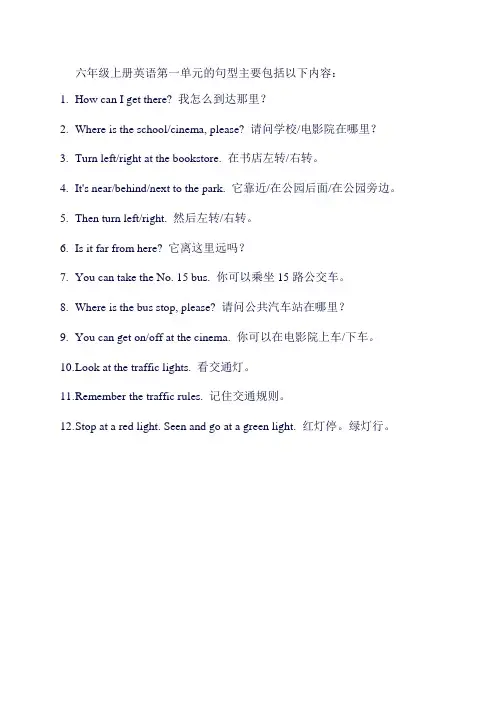
六年级上册英语第一单元的句型主要包括以下内容:
1.How can I get there? 我怎么到达那里?
2.Where is the school/cinema, please? 请问学校/电影院在哪里?
3.Turn left/right at the bookstore. 在书店左转/右转。
4.It's near/behind/next to the park. 它靠近/在公园后面/在公园旁边。
5.Then turn left/right. 然后左转/右转。
6.Is it far from here? 它离这里远吗?
7.You can take the No. 15 bus. 你可以乘坐15路公交车。
8.Where is the bus stop, please? 请问公共汽车站在哪里?
9.You can get on/off at the cinema. 你可以在电影院上车/下车。
10.L ook at the traffic lights. 看交通灯。
11.R emember the traffic rules. 记住交通规则。
12.S top at a red light. Seen and go at a green light. 红灯停。
绿灯行。
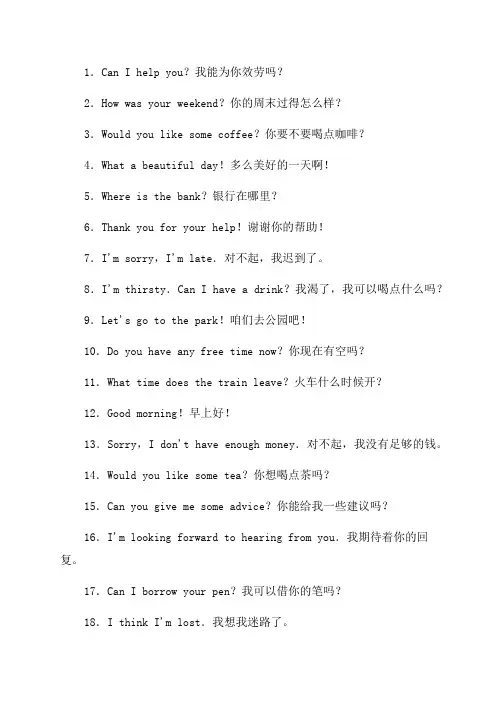
1.Can I help you?我能为你效劳吗?2.How was your weekend?你的周末过得怎么样?3.Would you like some coffee?你要不要喝点咖啡?4.What a beautiful day!多么美好的一天啊!5.Where is the bank?银行在哪里?6.Thank you for your help!谢谢你的帮助!7.I'm sorry,I'm late.对不起,我迟到了。
8.I'm thirsty.Can I have a drink?我渴了,我可以喝点什么吗?9.Let's go to the park!咱们去公园吧!10.Do you have any free time now?你现在有空吗?11.What time does the train leave?火车什么时候开?12.Good morning!早上好!13.Sorry,I don't have enough money.对不起,我没有足够的钱。
14.Would you like some tea?你想喝点茶吗?15.Can you give me some advice?你能给我一些建议吗?16.I'm looking forward to hearing from you.我期待着你的回复。
17.Can I borrow your pen?我可以借你的笔吗?18.I think I'm lost.我想我迷路了。
19.What's the weather like today?今天天气怎么样?20.Do you have any plans for the weekend?你周末有什么计划吗?。
五升六年级·六年级英语『六年级英语上册重点句子77个』外研版We lived in a small house many years ago.多年前我们住在小房子里.We live in a big house now.现在我们住在大房子里.She didn't have a television last year.去年她没有电视.There weren't any buses then.那时没有公共汽车.There are lots of buses and cars now.现在有许多公共汽车和小汽车.I'm going to meet you in New York .我会在纽约接你。
Life was very different in China many years ago.许多年前中国的生活大不相同。
I watch TV every day .我每天看电视。
Yesterday I watched TV with my grandchildren .昨天我和孙子们一起看电视。
She didn't have a television or a radio then.那时她既没有电视也没有收音机。
As a small child, she couldn't see or write.在她还是个小孩子的时候,她既不会看也不会写。
She learnt English.她学过英语.Mr Li was a teacher then.那时李先生是一名老师.Everyone speaks English .大家都说英语。
We went in a yellow taxi to their flat last week.上周我们坐一辆黄色小汽车去了他们的公寓。
He's learning English now.他现在正在学英语Why is she wearing these clothes?她为什么穿着这些衣服呢?Because she was a dancer.因为以前她是个舞蹈演员。
六年级上册英语句子阅读【篇一】六年级上册英语句子Where……1. A: Where are you from? 你来自于哪里?B: I’m from America. 我来自于美国。
2. A: Where is my car ? 我的小汽车在哪里?B: It’s under the chair.在椅子底下。
3.A: Where’s my seat? 我的座位在哪?B: It’s near the door. 在门附近。
4. A: Where is the teachers’ office ?办公室在哪?B: It’s on the first floor. 在一楼。
5. A: Where are they ? 他们在哪儿?B: They are in the woods. 他们在树林里。
6.A: Where is your home? 你的家在哪儿?B: My home is near the post office . 我的家在邮局附近。
7. A: Where is the cinema,please? 请问,电影院在哪儿?B: It’s next to the hospital. 在医院隔壁。
8. A: Where is the post office? 邮局在哪儿?B: It’s east of the cinema. Turn left at the cinema , then go straight. It’s on the left.在电影院的东面。
电影院左转,然后直走。
邮局在左边。
9. Where are you going this afternoon? 今天下午你要去哪里? I’m going to the bookstore. 我要去书店。
10. A:Where did you go on your holiday? 你假期去了哪? B:I went to Xinjiang. 我去了新疆.【篇二】六年级上册英语句子How…..1. A: How are you ? 你身体怎样?B: Fine, thank you . 很好,谢谢。
六年级上册英语必背句子1. My name is [你的名字].(我的名字是[你的名字]。
)。
2. How old are you?(你几岁了?)。
3. I am [你的年龄] years old.(我[你的年龄]岁了。
)。
4. Where are you from?(你来自哪里?)。
5. I am from [你的国家/城市].(我来自[你的国家/城市]。
)。
6. What is your favorite color?(你最喜欢的颜色是什么?)。
7. My favorite color is [你的最喜欢的颜色].(我最喜欢的颜色是[你的最喜欢的颜色]。
)。
8. How many brothers and sisters do you have?(你有几个兄弟姐妹?)。
9. I have [你的兄弟姐妹数量] brothers and [你的兄弟姐妹数量] sisters.(我有[你的兄弟姐妹数量]个兄弟和[你的兄弟姐妹数量]个姐妹。
)。
10. What is your favorite subject at school?(你在学校最喜欢的科目是什么?)。
11. My favorite subject at school is [你的最喜欢的科目].(我在学校最喜欢的科目是[你的最喜欢的科目]。
)。
12. What do you like to do in your free time?(你在空闲时间喜欢做什么?)。
13. I like to [你的兴趣爱好].(我喜欢[你的兴趣爱好]。
)。
14. What is your favorite food?(你最喜欢的食物是什么?)。
15. My favorite food is [你的最喜欢的食物].(我最喜欢的食物是[你的最喜欢的食物]。
)。
这些句子涵盖了自我介绍、个人信息、喜好、家庭、学校等方面的内容,是六年级上册英语必背的基本句子。
希望对你有帮助!。
关于六年级上册的英语句子(经典版)编制人:__________________审核人:__________________审批人:__________________编制单位:__________________编制时间:____年____月____日序言下载提示:该文档是本店铺精心编制而成的,希望大家下载后,能够帮助大家解决实际问题。
文档下载后可定制修改,请根据实际需要进行调整和使用,谢谢!并且,本店铺为大家提供各种类型的经典范文,如演讲稿、总结报告、合同协议、方案大全、工作计划、学习计划、条据书信、致辞讲话、教学资料、作文大全、其他范文等等,想了解不同范文格式和写法,敬请关注!Download tips: This document is carefully compiled by this editor. I hope that after you download it, it can help you solve practical problems. The document can be customized and modified after downloading, please adjust and use it according to actual needs, thank you!In addition, this shop provides you with various types of classic sample essays, such as speech drafts, summary reports, contract agreements, project plans, work plans, study plans, letter letters, speeches, teaching materials, essays, other sample essays, etc. Want to know the format and writing of different sample essays, so stay tuned!关于六年级上册的英语句子小学生已经开始陷入写作的难题,才发现积累的词汇句子根本不够,提高写作能力成问题接下来本店铺在这里给大家带来关于六年级上册的英语句子,希望对你有所帮助!1.No, I’m a single son. 没有,我是独生子。
六年级上册的英语句子有哪些(经典版)编制人:__________________审核人:__________________审批人:__________________编制单位:__________________编制时间:____年____月____日序言下载提示:该文档是本店铺精心编制而成的,希望大家下载后,能够帮助大家解决实际问题。
文档下载后可定制修改,请根据实际需要进行调整和使用,谢谢!并且,本店铺为大家提供各种类型的经典范文,如演讲稿、总结报告、合同协议、方案大全、工作计划、学习计划、条据书信、致辞讲话、教学资料、作文大全、其他范文等等,想了解不同范文格式和写法,敬请关注!Download tips: This document is carefully compiled by this editor. I hope that after you download it, it can help you solve practical problems. The document can be customized and modified after downloading, please adjust and use it according to actual needs, thank you!In addition, this shop provides you with various types of classic sample essays, such as speech drafts, summary reports, contract agreements, project plans, work plans, study plans, letter letters, speeches, teaching materials, essays, other sample essays, etc. Want to know the format and writing of different sample essays, so stay tuned!六年级上册的英语句子有哪些六年级的学生写作能力不好,想要提高写作能力,其实不用死记硬背词汇,而是转移到句子上面,同时也可以掌握词汇接下来本店铺在这里给大家带来六年级上册的英语句子有哪些,希望对你有所帮助!1.Mr. Green, Mr. Smith is here. 格林先生,史密斯先生在这里。
【导语】亲爱的孩⼦,你有着最令⼈羡慕的年龄,你的⾯前条条道路⾦光灿灿,愿你快快成长起来,去获取你光明的未来。
以下是⽆忧考为⼤家整理的《⼩学六年级英语上册句⼦【三篇】》供您查阅。
【篇⼀】1、Where is the museum shop?博物馆的商店在哪⼉? 2、 It’s near the door. 在⼤门附近。
3、I want to buy a postcard. 我想买⼀张明信⽚。
4、I want to send it today. 我想今天寄出。
5、I’ll ask. 我去问问。
6、Wow, a talking robot! 哇!⼀个讲话机器⼈。
7、What a great museum! 好棒的⼀家博物馆! 8、There is a pet hospital in my city. 在我的城市有⼀家宠物医院。
9、Wu Yifan and Robin are looking at some robots. 吴⼀凡和罗宾正在看⼀些机器⼈。
10、How can we get there?我们怎么到那⼉? 11、Turn left at the bookstore.在书店左转。
12、I know a great Italian restaurant. 我知道⼀家很棒的意⼤利餐厅。
13、Chen Jie is trying to be a tour guide for Oliver in Beijing. 陈洁正试图给奥利佛当北京的向导。
14、Wu Yinfan’s grandpa gave Robin a new feature. 吴⼀凡的爷爷给罗宾增加了⼀个新功能。
15、My new GPS works!我的全球定位系统起作⽤了。
16、My stomach hurts.我的胃不舒服了。
【篇⼆】1、How do you come to school?你怎么来学校的? 2、 Usually, I come on foot.通常我⾛路来。
六年级上册英语句子六年级上册英语句子_PEP新版六年级上册英语重点句六年级上册英语重点句(Unit 1-3)六上 Unit 1 1. A: Where is the museum shop? B: It’s near the door. 2. A: How can we get there? B: Turn left at the bookstore. 3. I want to buy a postcard. 4. I don’t know. 5. What a great museum! 6. What an interesting film! 7. Wu Yifan’s grandpa gave Robin a new feature. 8. He now has GPS. 9. He can help the boys find the Italian restaurant. 10. Let’s eat first. I’m so hungry.姓名: ______________博物馆的商店在哪儿?在大门附近。
我们怎么到那儿?到书店左转。
我想买一张明信片。
我不知道。
真是个伟大的博物馆!真是一部有趣的电影!吴一凡的爷爷给 Robin 一个新特性。
现在他有 GPS 了。
他能帮助男孩们找到意大利餐厅。
我们先吃。
我很饿。
六上 Unit 2 1. A: How do you come to school? B: Usually, I come on foot. 2. In the USA people on bikes must wear a helmet. 3. Don’t go at the red light! 4. I must pay attention to the traffic lights! 5. A: How can I get to the Fuxing Hospital? B: Take the No. 57 bus over there. 6. Slow down and stop at a yellowlight. 7. Stop and wait at a red light. 8. Go at a green light. 你怎么来学校的?通常我走路来。
在美国骑自行车的人必须戴头盔。
别闯红灯。
我必须注意交通信号灯!我怎样能去到福星医院?乘坐那边的 57 路公交车。
黄灯减速停下来。
红灯停下来等。
绿灯走。
9. But in 2009, they went to school by plane because the ferry didn’t work.六上 Unit 3 1. A: What are you going to do tomorrow? 明天你打算干什么?1B1: I am going to have an art lesson. 我打算上一节美术课。
B2: We’re going to draw some picture in Renmin Park.我们打算在人民公园画画。
2. A: Where are you going? 你们打算去哪里?B: We’re going to the cinema. 我们打算去电影院。
3. A: When are you going? 你打算什么时候去? B: Next weekend. 下一个周末。
4. Have a good time. 玩得开心。
5. I have to do my homework now. 现在我不得不做我的家庭作业。
6. I am going to see a film tomorrow. 我打算明天去看电影。
六上 Unit 4 1. A: What are Peter ’s hobbies? 皮特的爱好是什么? B: 2. He likes reading stories? 他喜欢读故事。
他住在悉尼吗?不,不是。
A: Does he live in Sydney? B: No, he doesn’t.3.A: Does he like doing word puzzles and going hiking? 他喜欢猜字谜和远足吗? B: Yes, he does. 是的,他喜欢。
他喜欢功夫和游泳吗?4. A: Does he like doing kung fu and swimming? B: Yes, he does. 5. A: What do you like? B: Cake, for sure. 6.. I don’t have any cake. 7. 是的。
你喜欢吃什么?当然是蛋糕啦。
我不吃蛋糕。
A: Does he live on a farm?他住在农场吗?不是。
他住在南岛。
B: No. He lives on the South Island.六上 Unit 5 1. A: What does he do? 他是做什么的?B: He’s a businessman.他是商人。
22. A: Where does he work? B: He works at sea.他在哪儿工作?他在海上工作。
他怎么上班?他骑自行车上班。
我将来当一名校长。
你也想当一名校长吗?3. A: How does he go to work? B: He goes to work by bike.4. I’m going to be a head teacher one day. 5. A: Do you want to be a head teacher, too? B: No, I want to be a businessman. 6. He often goes to other countries. 7. She’ll be here today. 8. He works on a boat.不,我想当一名商人。
他经常去其他国家。
她今天会在这。
他在船上工作。
9. H works very hard and stays healthy. 他努力工作并保持健康。
10. He is good at football. 他擅长踢足球。
11. If you like science, you can be a scientist 如果你喜欢科学,你可以当一名科学家。
六上 Unit 6 1. They’re afraid of him. 它们害怕它。
这只猫很生老鼠的气。
2. The cat is angry with the mice. 3. What’s wrong? 4. Your father is ill. 怎么了?你爸爸病了。
5. He should seea doctor this morning. 6. Don’t be sad. 别伤心。
7. A: What’s this cartoon about? B: It’s about a cat.他今天早上应该去看病。
这个卡通是关于什么的?是关于一只猫。
爸爸感觉如何?8. A: How does Dad feel now? B: Not well. 不好。
9. Whatshould he do?他应该做什么?你应该多锻炼。
你应该穿暖和的衣服。
你应该深呼吸并数到十。
10. You should do more exercise. 11. You should wear warm clothes.12. You should take a deep breath and count to ten.3六年级上册英语句子_六年级英语上册重点句型六年级英语上册重点句型Unit 1 Are you going to have a birthday party? 1. 重点词汇 weather 天气(可数或者不可数) sunny 晴朗的(名词变形容词) will 将要(情态动词+动词原形) begin 开始(begin to do sth.) 2. 重点短语 make a cake 做蛋糕 invite some friends eat noodles 吃面条邀请朋友 sing and dance 唱歌跳舞 visit my friends 拜访朋友 take swimming lessons 上游泳课 do some washing 洗刷 by the way 顺便问一下 3. 重点句型(考试必备) My birthday is coming. Are you going to make a cake? Would you like to come? This is my plan for this Sunday. What about your plan? On May 3rd, I’m going to help my mum do some washing. The weather is good. The party will begin at four o’clock. I’m asking my uncle and aunt to come to my party. Could I bring him to the party? 4. 必考语法一般将来时时:tomorrow、the day after tomorrow, next+时间,in+将来的时间等态:主语+will+动词原形+其他. 主语+shall+动词原形+其他. (适合主语时第一人称)主语+be going to +动词原形+其他. 句型:否定句:主语+ will+ not+动词原形+其他. 主语+shall+ not+动词原形+其他.(适合主语时第一人称)主语+be going to +not+动词原形+其他. 疑问句: Yes, I am./No, I am not. I’m going to have a party at home next Sunday evening.一般疑问句;will/shall +主语+动词原形+其他? Be+主语+going to+其他?特殊疑问句:特殊疑问词+一般疑问句? Unit2 What are you going to do tomorrow? 1.重点词汇 China 中国(小写的意思,以及形容词的用法) son 儿子(同音词) never 从不,绝不(频度副词) another 另一个(和 the other 的区别) 2.重点短语 do some shopping 购物 buy some school things 买一些学校用品 listen to music 听音乐 clean his room 打扫房间 play football 踢足球 wash some clothes 洗衣服 see a film 看电影 a map of China 一张中国的地图 3.重点句型 What are you going to do tomorrow? What’s he going to do? I’m going to do some shopping. How can I go with you? Do you want to know why? John isn’t going to clean his house or wash his car. 4.重点语法一般将来时特殊疑问句(U1) Unit3 It will be sunny this Sunday. 1. 重点词汇名词---形容词 rain 雨,下雨(动词和名词的形式) full 满的(be full of)充满 bring about 引起,发生 be bad for 对……有害 full of 充满 2. 重点短语 All around 周围 on the ground 在地上 on the ships 在船上at sea 在海上strong wind 强风 heavy rain 暴雨 3.重点句型 It’s nice outside, isn’t it? What will the weather be like tomorrow? It will be cloudy and windy. Will it be cold? Have a nice holiday! The earth is getting warmer. This will bring about great changes in the weather. That will be bad for the people there. In some dry places the rain makes lakes full of water. 4.重点语法反义疑问句(1)前肯后否主语+be 动词+其他,be+ not+主语?主语+实意动词+其他,助动词+not+主语?(2)前否后肯主语+be 动词+not+其他,be 动词+主语?主语+助动词+not+动词原形+其他,助动词+主语? Unit4 What kind of books will you buy?1.重点词汇 difficult 困难的(同义词和反义词) healthy 健康的(名词)2.重点短语 cut down 砍到 kind of books 种类的书 this term 这学期 take some photos 照相3.重点句型 What kinds of books will you buy? What will you do tomorrow? Is it difficult? Will you buy any books? What will you do when you grow up? I will be a nurse. Many people will go up to the hills and plant trees. Trees make the air clean. They will make the people healthy and make our country beautiful.4.重点语法和 will 相关的疑问句。